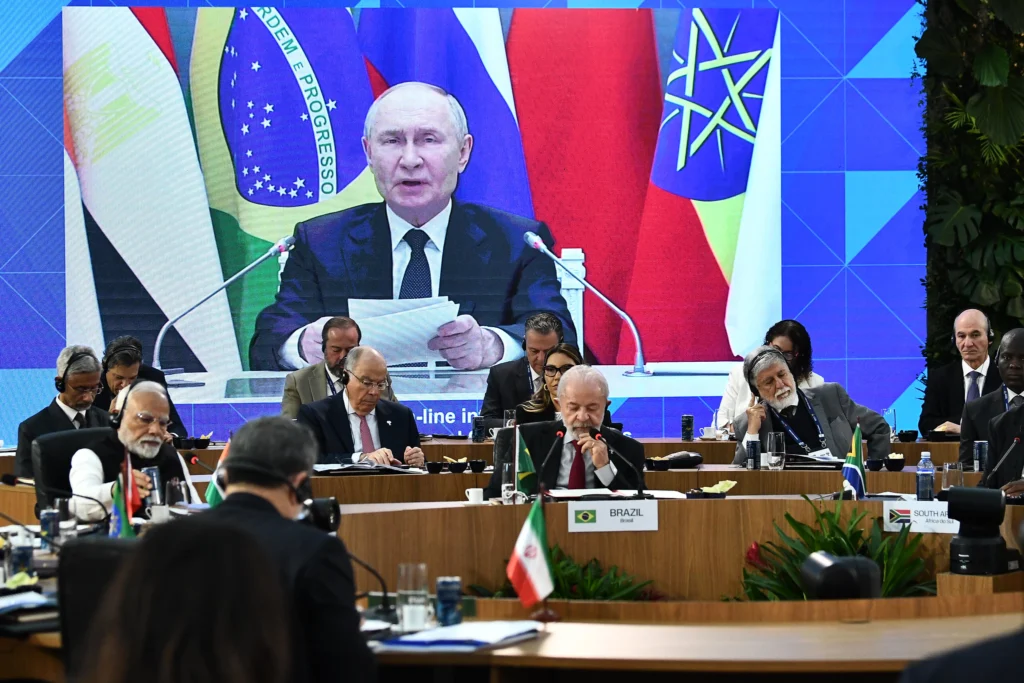7 Essential Insights from the Rising BRICS Summit 2025: A Critical Call for Global Peace and Reform

Lula condemned the genocide committed by the Israeli occupation in the Gaza Strip, which occurs with the complicity of the United States and other imperialist powers. He also lamented the recent decision by the North Atlantic Treaty Organization (NATO) to increase its military spending. jule 6, 2025 Photo: teleSUR
July 6, 2025 Hour: 11:49 am
Discover 7 essential insights from the rising BRICS Summit 2025 in Rio, highlighting urgent calls for global governance reform and lasting peace.
Related: BRICS Summit Opens in Brazil as Global South Leaders Arrive
7 Essential Insights from the Rising BRICS Summit 2025
The BRICS Summit 2025 officially opened this Sunday in Rio de Janeiro, marking a pivotal moment for the Global South’s collective voice and cooperation. With heads of state, foreign ministers, and high-level delegates present, the summit underscores the bloc’s growing influence in shaping a more inclusive and sustainable global order. Brazilian President Luiz Inácio Lula da Silva set the tone with a powerful inaugural speech urging urgent reforms in global governance and a steadfast commitment to peace amid ongoing international conflicts and inequalities.
Lula’s Urgent Call for Global Governance Reform and Peace at the BRICS Summit 2025
At the heart of the BRICS Summit 2025 opening, President Lula emphasized unity and dialogue as essential tools for achieving global peace. He called on member countries to support ongoing diplomatic efforts to end the Russia-Ukraine conflict, which he criticized as exacerbated by NATO’s involvement. “The world needs peace, not more wars that only serve imperialist interests,” Lula declared, condemning the Israeli occupation’s actions in Gaza and highlighting the complicity of the United States and other imperial powers in this humanitarian crisis.
Lula also expressed deep concern over NATO’s recent decision to increase military spending at a time when resources should prioritize fighting poverty and growing inequalities worldwide. “The current international structure is archaic and exclusionary, incapable of resolving the severe crises facing humanity,” he stated. He praised the BRICS’ efforts to strengthen the United Nations and reform its Security Council, pointing out that the current body no longer reflects the balance of power in today’s world.
An Expanded BRICS: New Members and Growing Influence
The BRICS Summit 2025 is particularly significant as it consolidates the bloc’s expansion, now comprising ten full members and several associate countries. Founded in 2009 by Brazil, Russia, India, and China, with South Africa joining in 2011, the group has grown substantially. In August 2023, Iran, Saudi Arabia, Egypt, Ethiopia, and the United Arab Emirates were admitted as full members during the Johannesburg summit. The following year, Belarus, Bolivia, Kazakhstan, Cuba, Malaysia, Nigeria, Thailand, Uganda, and Uzbekistan joined as associate members.
This expansion reflects the bloc’s ambition to represent a broader spectrum of the Global South, enhancing its geopolitical and economic weight on the world stage.
Leaders Arrive Amidst a Spirit of Cooperation
The summit’s inauguration at Rio’s Museum of Modern Art (MAM) welcomed key figures such as Iran’s Foreign Minister Abbas Araghchi, India’s Prime Minister Narendra Modi, and Russia’s Foreign Minister Sergey Lavrov, representing founding members with significant geopolitical influence. Ethiopia’s Prime Minister Abiy Ahmed Ali also attended, representing one of the bloc’s newest full members.
In a gesture of fraternity, President Lula received the Crown Prince of Abu Dhabi and Vice Head of State Khaled bin Mohamed bin Zayed Al Nahyan, alongside Saudi Arabia’s Crown Prince and Prime Minister Mohammed bin Salman Al Saud. South African President Cyril Ramaphosa and Indonesian President Prabowo Subianto joined later. Russian President Vladimir Putin participated via videoconference, while China was represented by Prime Minister Li Qiang in the absence of President Xi Jinping.

NATO official site for background on military spending: https://www.nato.int/cps/en/natohq/topics_49198.htm
Key Agenda: Peace, Governance, and Technological Development at BRICS Summit 2025
Following the traditional group photo, the leaders began discussions focused on “Peace and Security and Reform of Global Governance.” The afternoon session will address “Strengthening Multilateralism, Economic and Financial Affairs, and Artificial Intelligence,” signaling BRICS’ intent to be a key player in global governance and technological innovation.
An innovative aspect of this summit is the direct inclusion of social movements, labor unions, academics, and civil organizations from member countries, who will present their agendas to the leaders. This initiative aims to strengthen participatory democracy and social inclusion within the bloc’s framework.

United Nations official website on Security Council reform: https://www.un.org/securitycouncil/
The Economic and Demographic Weight of BRICS
Currently, the BRICS countries account for 48.5% of the world’s population and 39% of global GDP. They are responsible for 24% of global trade, 43.6% of oil production and reserves, and 78.2% of coal reserves. The bloc is also a leader in developing alternative technologies, adopting new innovations, and advancing digital transitions.
This economic and demographic clout positions BRICS as an effective counterbalance to traditional powers, advocating for a fairer, multipolar international system that respects the sovereignty of all nations.
World Bank data on global poverty and inequality: https://www.worldbank.org/en/topic/poverty
The Global South’s Role as a Protagonist in World Affairs
The Rio de Janeiro summit reaffirms the vital role of Global South countries in building a more equitable world. BRICS cooperation aims to overcome historical inequalities and promote sustainable development that benefits the majority rather than elites.
As Lula stated, “BRICS represents hope for a world where emerging and developing countries have a voice and vote in decisions that affect all humanity.” This vision drives concrete efforts to reform outdated international institutions and prioritize social justice, solidarity, and peace.
Conclusion: A Turning Point for Inclusive and Sustainable Global Cooperation
The BRICS Summit 2025 in Rio de Janeiro stands as a decisive forum to strengthen Global South cooperation, push for reforms in global governance, and promote peace amid rising geopolitical tensions. Under leaders like Lula, the bloc reaffirms its commitment to a more inclusive, sustainable, and just world where historically marginalized voices are heard and respected.






